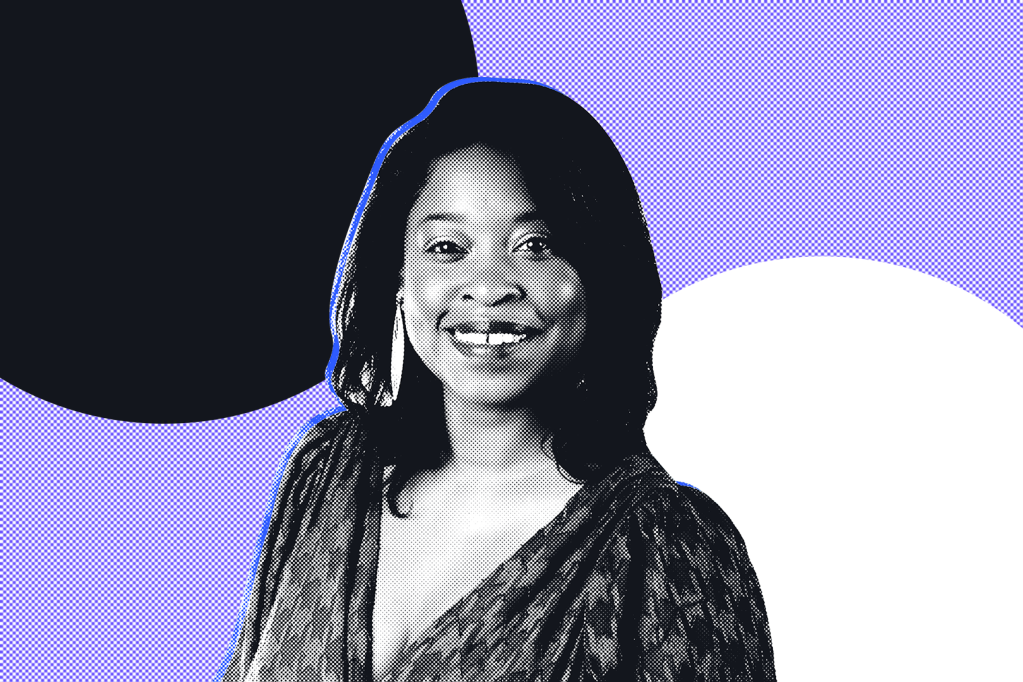This is a transcript of the podcast Lavinia Osbourne on the power of Blockchain and crypto inclusivity between senior reporter Carmen Cracknell and blockchain advocate Lavinia Osbourne.
[INTRO]
Carmen Cracknell: So Lavinia, it’s great to have you here on the GRIP Podcast. Thank you so much for joining us. Can you start by telling us a bit about you, your background and what you’re involved in right now?
Lavinia Osbourne: Hi, thank you so much for inviting me on to this podcast. I’m very happy to be here and to share a little bit about myself. So my name is Lavinia Osborne, as stated, and I am the founder and the CEO of Women in Blockchain Talks. Women in Blockchain Talks is the number one global blockchain, educational and networking platform with DEI at its core. What does that mean exactly? It basically means that blockchain in and of itself. And I’m hoping that you do know what blockchain is. And if you don’t, please do ask me the question. But blockchain is a technology that has a lot of egalitarian ideologies around it, which is focusing on equity and equality. And so one of the things that Women in Blockchain Talks stands for is about ensuring that many voices, diverse voices are heard in the not only in the space, but in the creation of the space and the building of the space. Because I believe and a lot of people in the business world, entrepreneurial world, thought leaders in tech, they believe that blockchain is a future of money, of engagement, of business and career. So it’s really important that many voices are heard and not just the homogenous few. So that’s what I’m doing at the present moment. My background, I’ve been an entrepreneur for the last 15 years, I started my first proper entrepreneurial business was all about financial education, your relationship with money. How does it make you feel? What you think about it? What do you say about it? Because many times we’re not taught about money. And we’re taught how to get a job and earn money. But we’re not taught how to have a relationship with money and how to build it, how to invest in it and how to make it work for us, especially if you’re just from a normal working class background, so to speak. So off the back of me doing that work, that’s how I was introduced to the world of cryptocurrency, Bitcoin and blockchain. And of course, like many people, when I first started in the space, I thought, or learning about this space, even I thought blockchain and Bitcoin were the same. But they’re very distinctive, because blockchain is a technology and Bitcoin is a cryptocurrency which is part of the blockchain ecosystem.
Carmen Cracknell: Yeah, I have some kind of knowledge myself, I’ve been trading cryptos for a while. And I do kind of understand that the blockchain technology that underpins, as they say, Bitcoin and other cryptos can be used in other sectors. How does the technology for those who kind of don’t understand it, if you as an expert could break it down, how does the technology, blockchain technology itself have the potential to bring about financial inclusivity?
Lavinia Osbourne: So the thing about blockchain technology, what makes it distinctive is the transparency of it. So blockchain falls under DLT, distributed ledger technology. So there’s all different types of technologies out there, right? So blockchain falls under distributed ledger technology, which, if you listen to the words, it’s about recording data, we’re talking about data here. Now, most times when data is recorded, it’s controlled, the ownership is controlled and delivered by a centralized figure. The key element with blockchain is that it’s decentralized. Now, when we talk about blockchain technology, generally speaking, we’re talking about decentralization. Whereas there are some blockchain platforms that are not decentralized, and there’s reasons behind that. So you can have some blockchains that are hybrids, or they are a public blockchain, or they’re a private blockchain. So when I talk about blockchain technology, I’m talking about decentralization and a public blockchain. And so with a public blockchain, you are able to go to the ledger, which could be, for example, Etherscan or BlockScan. So Etherscan is the data for Ethereum, for the Ethereum network. BlockScan is for the Bitcoin platform. And then you’ve also got, for example, Polyscan. And Polyscan is the data or the ledger for the Polygon platform, the Polygon cryptocurrency platform, or even ecosystem rather than cryptocurrency. So one can then go to that ledger, and they’re able to put in the transaction number or the wallet number if they have the wallet details, and they’re able to see all the different transactions. And so what makes blockchain so different, and why it adds to the plausibility of creating change, particularly around financial equity, and financial equality, and sharing the wealth, is because it’s transparent, and the data is available for all, and the way that the technology works, it makes transactions more trackable and traceable. It also creates more efficiency in regards to the time it takes, the duration, and also it reduces the cost because it removes that middleman, that centralized figure, that intermediary, that third party. And this is the reason why financial institutions are utilizing blockchain, even if they’re using it in a hybrid manner or in a private manner, they’re using the technology in and of itself because it reduces costs and it’s more effective.
Now, a perfect example of this, of course, is Bitcoin. So what Bitcoin did, it showed the world that you didn’t need a third party, a bank, or a Western Union to transfer money. You didn’t have to go through that intermediary. It was quick and it was more cost effective. Of course, prices have increased over the years, but even so, it just allows people to be their own bank if you understand the concept of cryptocurrency and also of Bitcoin in and of itself. And one of the key things about Bitcoin that no one can dispute is that it doesn’t belong to any country. It doesn’t belong to any organization. It is independent. And this is why there are many people who embrace Bitcoin, believe in Bitcoin, and believe it will be the currency of the future.
Carmen Cracknell: Yeah, it’s really interesting, this idea of data belonging to the user and data is such a precious resource in tech companies. What’s keeping them, these large companies that have monopolies on data from taking control of the blockchain?
Lavinia Osbourne: You can’t take control of the blockchain because how the blockchain works is that there are different nodes and all these different nodes, think of nodes as computers. And so all these different nodes, they work with each other. So if one person tries to edit the data on one node, then all the other nodes will be like, that’s incorrect. And this is what makes it decentralized. So there is no one company that can just go into the blockchain that has been created that is in existence already and just take over. It’s not possible. However, big tech companies can create their own blockchains, but then it takes away from that ownership, that transparency, because it still means that the data that is being recorded is in the control and the ownership of that big tech company. This is why there’s many questions around CBDCs, central bank digital currencies. So of course, financial institutions, when they first heard about crypto currencies, Bitcoin, Ethereum, they just wrote it off as like, oh, it’s just something that’s going to come and go. But they could see that it’s grown legs, it’s grown arms. And so the financial institutions and the reserve banks, ultimately, so the Federal Reserve, the ECB, so central banks, sorry, not reserve banks, but the central banks, ECB, Bank of England, they’re never going to give their power away. This is power that they’ve held for a number of years, not just 10, 20, 50, hundreds, hundreds and hundreds of years. So they’re looking at the technology and they can see the benefit of the technology in regards to the quickness and also the efficiency in regards to costing as well. They can see the benefits of that. And they can see that, you know, money has always evolved over the years. If you think about it, we used to exchange transactions or create transactions with bags of gold, and then it changed to permissionary notes. And then even if you look at the dollar, the dollar first was in gold we trust, and then they removed gold as the backing of the currency, and then it became in God we trust. So maybe the aesthetics of our currency hasn’t changed, but money and how it’s transacted and what stands behind it has evolved over the years. So people in economics, people in power, people in finance, they can see that money is changing again and it’s changing into a digital staple, so to speak. And with that being said, they don’t want to, they, most people are not using cash. And so creating a central back digital currency gives them the opportunity to leverage this evolution of money, of digital currency, but still have ownership of it.
Carmen Cracknell: Yeah, I’ve heard sort of Bitcoin and crypto purists, I guess you call them, talk about CBDCs as kind of moving away from the anonymity or the the pseudonimity, I can never say that word, of pseudonimity of crypto. What do you think about CBDCs? Are they good or bad? Are they polluting the concept of crypto?
Lavinia Osbourne: I don’t think that the Bitcoin purists are wrong, but they’re Bitcoin purists. Not everyone is a Bitcoin purist. So they’re not going to have that ideology, they’re not going to have that reasoning. You speak to the everyday person on the street, or the grandmother, maybe in their 60s or 70s who are not tech-orientated or business orientated, Bitcoin is going to go over their head. And lots of people, unfortunately, they will follow suit of what the government says. They won’t question it. It’s where we talk about trust and trustless. That’s what decentralization is about. It’s about having the ability to check the information for yourself so you don’t have to give your trust. The information is just there. Whereas when we live, or as we do live in a centralized economy in a society, we do have to give our trust. We have to give our trust to the bankers. We have to give our trust to the government. We have to trust out their decisions and how they make the decisions and the and the deals that they make behind closed doors are for our benefit. So with CBDCs, many people will just fall in line and be happy to utilize it. But the questions that will come up is how will the data be used for us and or against us? When an entity has that much power to be able to shut down your ability to access money because it’s digital, that gives too much power to one entity. So my thoughts on this is that if that was to happen, then people are resourceful. People are not just sheeps. A lot of people like to say that people are just sheeps. But if you push too hard, the sheeps will turn and they will look for alternatives. So for me, I am glad that Bitcoin exists. I’m glad that there’s a choice. But I know for many people, having a CBDC will be their choice because they don’t want to have to think about it. They don’t want to have to learn new things. And that’s fine. Who am I to judge them? Who is anyone to judge them? But for the ones who want to be Bitcoin purist or in the middle, then at least we have the choice to do that. So that’s my thought.
Carmen Cracknell: Sure. And there’s such a big debate at the moment about regulation in the UK and the US and elsewhere. How do you think, I mean, nobody can predict how that will play out. But do you predict that there might be fixed regulation coming and that that would help blockchain flourish?
Lavinia Osbourne: I think that regulation is a double edged sword. So in one hand, the reason why we need regulation and compliance is because there are bad actors. And you can’t as much as you want to have a… What’s that word when you have like a perfect society, a dystopian society?
Carmen Cracknell: A utopia.
Lavinia Osbourne: Right. Utopian society. That’s just not the society that we live in. We have to be realistic. And there are bad actors. I myself, I’m in this space. I lead in this space. I talk in this space. I’m very well aware of being secure in this space. But there’s lots of smart people in this world or in this space, in this world full stop and in this space, much cleverer than me and more technical than me. And I say this because two of my NFTs, my blue chip NFTs were stolen from my wallet. And this happened last year. And when it was stolen, I was asked, did you press any buttons? Did you download anything? I was like, no, I know not to press or download anything that I’m not aware of what its providence is. Right. And anyway, my NFTs were stolen and I took it to the high courts of England and Wales. And in doing so, I was granted the world’s first ever NFT proprietary injunction. So this was instead of a worldwide freezing order. So people who have a legal background, they’ll understand what a worldwide freezing order is. So of course, that’s more generic, whereas a proprietary injunction is stating that it’s my property and I’m putting in an injunction. And so in doing so, I created case law. Now, I’m proud of that. And I know that that case law is being used around the world as we speak. OK, because not only did it have an impact on the legal status of NFTs, but in regards to that, you know, its property. But it has an impact, of course, on insurance and taxation, because if something’s your property, then of course, you need to look at the insurance element and also the tax, the tax elements of it.
Now, if we had certain, you know, with it, with all with all law, new laws and cases and in a new space, when you think about legal, then regulation and compliance is its cousins, right? And so this case law that I helped create is being used to help regulation, help to create regulation and compliance. And because I’ve been, you know, on that end where I’ve been a victim of a crime, ultimately, I do believe that compliance and regulation needs to come into the space to help protect people. Now, some people will argue, and I think it’s a correct argument. Well, look at all the other industries outside of the web 3.0 space. They have regulation and they have compliance, but still crimes happen. And I agree that, yes, they do happen. But I do think having regulation and compliance is more of a deterrent to those who…and will help people think twice about committing crime. But I think the web 3.0 space has shown itself that it cannot self regulate itself. So what’s the solution? What’s the solution?
Carmen Cracknell: Sure. Just going back to because I know I’ve like veered slightly off the questions I had. I at the events I’ve been to in the last year, I’ve been to quite a few fintech events and people like something that comes up is AI is the huge topic now. And I’ve heard people say, Oh, it’s the new buzz term that blockchain was a few years ago. Have you noticed institutional interest in blockchain lesson in the last few years? And if so, why?
Lavinia Osbourne: No, I haven’t. I’ve seen it increase. I always say don’t watch or don’t listen to what you and you know what the news propaganda or what people say, watch what they do. And you know, we see BlackRock, they’ve put in a license for an ETF with Bitcoin. If the license is issued, that’s going to be that’s going to have a huge impact on cryptocurrency and how people see cryptocurrency. And BlackRock is a huge institution that has a lot of influence in the financial space, right? Not only the financial space, but the world of business. So I say there’s a lot of companies who are utilizing blockchain because they see and understand that blockchain is not just a use case for finance. It’s a use case for business enterprise, ultimately. And so when I think about AI, yes, it is a hot topic at the moment. And I think the reason why it’s more of a hot topic is because it’s more relatable. People can like jump onto chat GTP, and they can utilize it. I said that right? Is it chat GTP? Because I keep being so I get I confuse that as well.
Carmen Cracknell: I think it’s GPT, but I’ve heard people on the news call it GTP. So you can get way with that.
Lavinia Osbourne: I could get away with it. Okay, great. So I see so people are able to utilize it more quickly. And if you could do that, then it has more of a rapid uptake, so to speak, whereas blockchain is a technology ultimately, right? And you do need to have some element of you need to understand the technicality of blockchain to really grasp its its potential, and also understand its use cases. Now, as the CEO and founder of Women in Blockchain Talks one of my objective is to tell people, particularly people of diverse backgrounds, is that if you just want to utilize blockchain, and its ecosystem, and its products and services as a consumer, fair enough but my my point of doing what I do, my objective, my goal is to show people that you need to come in as diverse people to help build and to help create so that we do have a diverse blockchain space and ecosystem, rather than homogenous one, which just reflects the the the predictable, you know, the predictable key players and influencers in the business, tech and finance world. So my point is about creating and building. And therefore, if you want to create and build, you do need to understand some elements of the technology, or what the you know, behind the scenes under the hood of the technology, you don’t have to be a developer to understand that, but you do need to understand what makes blockchain technology stand out. So with that being said, how I see AI and blockchain merging, and complementing each other, so to speak, rather than using the word merge, is that we have a lot of fake news, you know, AI is about creating things and using other people’s data and information, right? AI isn’t just something that creates, you need to feed it information. Right now, I read on the news that Amazon are limiting people to publish their ebooks, I think it’s two a month, because they’re worried that people are mass producing using AI. So you know, it’s not necessarily their work, maybe it’s their ideas, but it’s not necessarily their work. And a lot of people are very worried about what sort of, you know, what copyright is being infringed upon. So what how blockchain works with or complements AI is, is validating it, like proving the providence of the source of that AI creation, so to speak, or the creation of any product now that we are in this AI age. So for me, take away, you know, the financial institutions and all the business enterprise institutions that are utilizing blockchain because of its efficiency, and its cost efficiencies, and things like that. But just on the side of validating the providence of the information that one is putting out there, blockchain has a place. So I see blockchain continuing to flourish and continuing to add use cases to the world of work, business and career.
Carmen Cracknell: Yeah, it’s definitely, I think, easier for people to grasp what AI is, because they use it on a daily basis for people who want to understand more about blockchain, and in particular, NFTs, because it seems like you have a lot of experience with those. How can they find out more about them and even how to invest in them?
Lavinia Osbourne: Sure. So I mean, I think I always think that you, I think the key thing is that if you hear of a project, follow them, do your due diligence, make sure that they are doxed, make sure you know who’s behind it. See if they have a following if they have a community. And then once you’re part of that community, you can learn more about NFTs, you can learn about why that NFT is potentially going to be a good investment. And then if you choose to invest in that, then you can. Some people invest in NFTs just because of the artists, some people invest in NFTs because of the community, and what they believe that NFTs going to stand for in the future. But you know, NFTs can be used in many different ways. In the legal industry, they’re utilizing it for part of their processes in regards to ensuring that a documentation that’s been created can then be recorded on the blockchain. So NFTs can be used for proof of certifications. It can be used as creating a database of content for memorabilia, family memorabilia, you know, for those, you know, many people want to do their DNA, they want to know about their history. All of that is now being recorded and digitalized onto the blockchain. So NFTs are not just collectibles or just something to invest in, they’re actual a way of digitalizing memories. So yeah.
Carmen Cracknell: That’s interesting. Just lastly, I wanted to ask if you had any figures that can show what the picture is like at the moment in terms of inclusivity in blockchain compared with other financial sectors? You know, how many women are involved in various projects? Do you have any figures like that?
Lavinia Osbourne: Yes, I do. So I recently was putting together my pitch deck, I’m looking to raise for women in blockchain talks. And when I was looking at the figures, it was showing that the numbers are increasing. So basically, a couple of years ago, it was at 12%. It’s now at 18%. So it’s increasing, but the numbers are just not where we would like it to be. And of course, when you look at finance, technology, FinTech, just the business world full stop, you know, unfortunately, the numbers are reflective of that. So the tech space, of course, there’s more women, but in blockchain, the numbers are still around the 18, 20%, maybe 22% maximum amount of women leading or women leading a company. And so blockchain, when I talk about blockchain, I’m touching on NFT web3 and cryptocurrency, because the data is coming more from the cryptocurrency angle, rather than the just web3 metaverse angle. With that being said, as well, it’s interesting to say that there’s a lot, you know, the data shows as well, especially this year, when the last year, I should say that there was more women starting their own businesses. So it’ll be quite intriguing to me to see in the future, how many of those businesses will have a web3 emerging tech blockchain slant to it, but we’re too early to see what the data is.
Carmen Cracknell: Yeah, it’s the figures could be a lot better, but they are far better, I think, than VC funding, I think it’s something like two, just 2% of VC funded businesses, or backed businesses, are female. Yeah, which is like, that’s just like shockingly bad. So…
Lavinia Osbourne: Well, it is and if you’re a ethnic minority, if you’re an ethnic minority, it’s less than 1%. So yeah, it is. And the government is and I think, again, we go back to that question of regulation compliance. So the government are saying that we give tax breaks to VCs. So if we’re giving tax breaks to VCs, and why is the money only, why is only 2% of that funds going to women? Why is it not being, you know, spread out to a diverse crowd? So I really hope the government are going to move forward with that conversation and push VCs to invest in diverse leaders, diverse founders. Let’s hope so. What I would like to add is like, so, you know, if you’re looking to start, you know, one of our missions for women in blockchain talks is to onboard 50,000 women into blockchain. And so that could look like you being a consumer, being a creative, could just you be interested in crypto, it could be you being looking to start a career in this space, or it could also be you looking to start a business in this space. And so women in blockchain caters for that. One of the key things for women in blockchain talks is that we are open toward genders, because you know, we stand for diversity and inclusivity, therefore we don’t exclude other genders. And most importantly, we are, you know, very, very proactive in the space. So we have a free community. So please come and have a look join us attend our event. And yeah, we look forward to getting you started up and running in the in the future of works, blockchain technology.
Carmen Cracknell: Lovely. Well, thank you so much for joining me, Lavinia. It was a really interesting discussion.
















